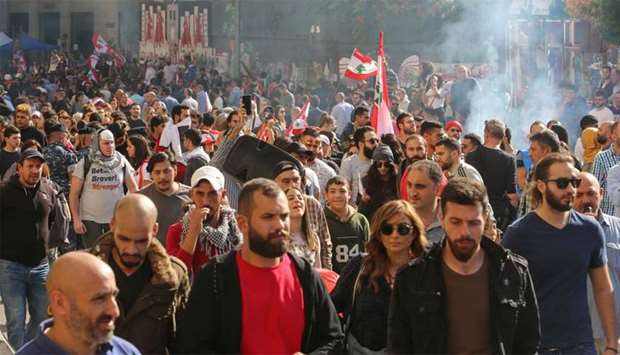Lebanon's parliament postponed its session on Tuesday after hundreds of anti-government protesters blocked all roads leading to the assembly in central Beirut, preventing lawmakers from reaching the area.
‘The session is postponed until further notice,’ Adnan Daher, the secretary general of the parliament, told local television stations.
The session was postponed due to a lack of quorum, Daher said.
Demonstrators were angered by Parliament Speaker Nabih Berri's decision to hold a session this week, prompting them to block the roads.
They argued that draft anti-corruption legislation, which lawmakers were due to discuss, includes clauses that could protect politicians if they were accused of misusing public funds and corruption.
One protester carried a placard that read: ‘We do not want them to approve laws that protect them and serve their interests.’ ‘We have 128 parliamentarians who are thieves,’ shouted protesters gathered near the parliament at Bab Idriss street.
‘The rats of the parliament,’ one protester was seen writing on one of the grand buildings in central Beirut.
As soon as the news spread that the parliament session was postponed, protesters started banging on electricity poles, clapping and chanting: ‘Revolution, revolution.’ Others were hugging each other and shouting, ‘We won!’ ‘We want them to discuss this law openly, which means it should be broadcast live on television and not discussed secretly among them,’ Alia Khalidi, a protester, told dpa.
Earlier, a lawmaker's convoy forced its way through the angry protesters as shots were fired in the air.
‘This lawmaker tried to hit protesters with his car to pave his way and then fired shots in the air when protesters hit his car and I was one of them,’ Khalidi said.
A government source said it was the finance minister's convoy, but he was not inside the car.
Hundreds of army soldiers and anti-riot police were deployed to prevent protesters from reaching the parliament building.
Some scuffles erupted earlier between anti-riot police and protesters. One protester was slightly wounded and another was arrested, local televisions said.
Lebanon has been hit by nationwide protests since October 17, leading to the resignation of prime minister Saad Hariri almost two weeks later.
Protesters have called for a government of technocrats and not politicians from the ruling class to help revive the country's economy, which has taken a downturn since the protests started.
Political wrangling between rival groups has so far delayed the formation of a new government.
Banks across Lebanon opened their doors to customers after a one week closure due to security reasons, during which people were only able to withdraw Lebanese pounds at cash machines but not foreign currency.
US dollars are widely used in Lebanon in day-to-day dealings.
Since the protests started, the Lebanese pound has been trading at around 1,900 to the dollar on the black market, a devaluation of nearly 30 per cent on the official rate, which stood at 1,515 to the dollar a month ago.
The banking association said customers are limited to withdrawing 1,000 dollars per week.

